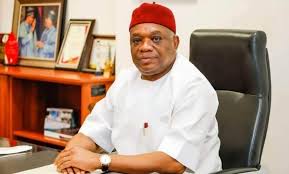In a powerful endorsement of President Bola Tinubu’s economic reforms, Senator Orji Uzor Kalu has voiced his support for the President’s rejection of economic policy prescriptions from the International Monetary Fund (IMF) and World Bank. The former Abia State governor and current lawmaker for Abia-North praised Tinubu for pursuing homegrown solutions to Nigeria’s economic problems, arguing that such bold decisions were necessary for the nation’s long-term prosperity.
Senator Kalu’s remarks came on Monday during a gathering at the Arochukwu Local Government Area residence of Chief Sunday Ugwa. The lawmaker took the opportunity to elaborate on Tinubu’s recent economic policies, emphasizing their significance in the country’s growth.
Kalu explained that, despite the pressure from international financial institutions, the Nigerian government had chosen to adopt local reforms that were better suited to the nation’s needs. He pointed out that the removal of the fuel subsidy, the merging of the exchange rate, and the liberalization of the foreign exchange system were among the critical decisions that had put Nigeria on the path to economic stability.
“Nigeria’s economic challenges are deeply rooted in local issues, and they require homegrown solutions,” Kalu remarked. “The decisions President Tinubu has taken are what no previous leader in the country dared implement. But we all know, deep down, these decisions were necessary for the country to move forward. We can no longer rely on policies that have failed elsewhere.”
In his address, Kalu drew attention to the overhauled Port Harcourt and Warri refineries, which had long been neglected, and the gradual stabilization of Nigeria’s exchange rate as key examples of the progress that Tinubu’s policies were achieving. He suggested that the decline in fuel prices marked the beginning of a broader economic recovery that would extend to other sectors.
“Just look at the price of fuel today compared to what it was months ago. The prices have already started to fall, and this is just the beginning. Over time, we will see a reduction in the prices of other goods and services,” Kalu affirmed.
Senator Kalu’s comments echoed his earlier criticism of the IMF and World Bank’s policy prescriptions, which he believes have often proven to be detrimental to developing countries. He urged other African nations, including Nigeria, to follow the example of the “Asian Tigers” — South Korea, Taiwan, Singapore, and Hong Kong — who resisted the financial prescriptions of these international bodies yet continue to thrive economically.
“The Asian Tigers rejected the IMF and World Bank’s economic packages, but look at where they are today. They have become some of the most successful economies in the world. We must learn from their example and chart our own path to prosperity,” Kalu stated.
The lawmaker also emphasized the importance of local participation in Nigeria’s democratic process. He warned against apathy among the youth, calling on them to engage more actively in politics to avoid allowing “charlatans” to take office.
“If young people do not participate in the democratic process, they risk allowing the wrong people to take power, and that will make the country’s future bleak,” Kalu said. “We cannot afford to let others decide our future. Democracy is for everyone, and it is time for the youth to stand up and make their voices heard.”
Kalu also took the opportunity to advocate for a shift in Nigeria’s economic strategy. He highlighted regional competition as a key driver for growth and cited China as an example of a country that has sustained remarkable economic growth over the past three decades, despite criticism over its human rights practices.
“China has been growing at 10 percent annually for 35 years, and they didn’t get there by following the IMF or World Bank’s advice. They focused on what worked for them, and that’s what Nigeria needs to do,” Kalu argued.
The senator’s speech resonated strongly with the local audience, who cheered him on as he discussed the importance of regional competition and the government’s role in fostering an environment conducive to growth.
“It is not enough for the government to make decisions; we all have to contribute to the process,” Kalu continued. “For Nigeria to develop, both the government and the people must work together to create the right conditions for growth.”
Kalu’s comments come at a time when Nigeria is facing significant economic challenges, including inflation, rising unemployment, and pressure from international bodies to adopt market-oriented reforms. While some have criticized Tinubu’s reforms for causing short-term hardship, Kalu remained optimistic about the long-term benefits of the President’s economic agenda.
The senator’s comments were met with applause from the crowd, who expressed their appreciation for his insights and leadership on economic issues. Chief Sunday Ugwa, who hosted the event, thanked Kalu for his continued commitment to the development of the region and the nation as a whole.
“Senator Kalu’s contributions to our community and to the nation are immeasurable,” Ugwa said. “We are grateful for his leadership, and we know that with him and others like him, Nigeria can overcome its current challenges and build a prosperous future.”

